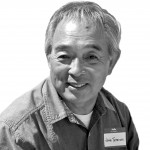Recently, the NCWNP district raised the No-No Boy issue, proposing that the JACL take a thorough look into the controversies surrounding the circumstances that led to the loyalty questionnaire in camp and, ultimately, to produce what amounts to a white paper and what I assume is an honest reckoning on this issue.
The NCWNP civil rights committee, by undertaking this new initiative, hopes to “show that [the No-Nos and renunciants] were not ‘disloyal’ as the government tried to tell us.” Furthermore, this investigation and recent historical research can serve to “debunk this myth [and accusation] of ‘disloyalty’” that “has harmed many families (down through the generations) and divided the Japanese American community.”
The ultimate goal, in addition to clearing the air, is to “hold the government accountable for this.”
I’m curious to know what the recent historical research is because, frankly, I’m not exactly sure what this new enterprise hopes to reveal that isn’t already known about the infamous Questions 27 and 28 and their impact on the lives of Japanese Americans.
Will it implicate the JACL somehow in the nefarious workings of the questionnaire? I’ve no doubt there are researchers in the APA community who would love to find that connection, and frankly, if there is one, I’d like to know.
But I don’t want assumptions and vague implications in place of facts and hard evidence. None of this “it appears that . . .” business. This is too serious to be based on nebulous information. But I trust the committee won’t let it come down to speculation; I know Andy Noguchi, the chair of the committee, and I trust his integrity. He doesn’t do things lightly and without reason.
So, if the research is able to make that connection, then I think we all need to know about it. Let’s get it out in the open and let the JACL’s current leaders deal with it honestly and openly.
If the goal is to debunk the myth of disloyalty, however, I think I may have missed something somewhere because I can’t imagine anyone in our community who still buys that old nonsense that the No-No Boys were disloyal. Maybe some of the veterans, but my sense is that that’s more about hard feelings at this point than accusations of actual disloyalty.
Back in 1975, as the chair of the NCWN district’s redress committee, I formed a select committee to put together a survey to measure how the JA community felt about redress. This was at a time when the vast majority strongly opposed the idea and I wanted a questionnaire to give me answers.
The committee consisted of Cherry Tsutsumida, the highest-ranking Asian in the Carter administration (she was temporarily living in S.F.); Ben Takeshita, committee co-chair; Ray Okamura, a virtual walking encyclopedia on the internment; and Mike Honda.
The survey wasn’t intended to be statistically valid but to get answers. Cherry kept pointing out that questions were leading and obviously sought certain kinds of responses, which, admittedly, was true, but the questions gave those opposed to redress plenty of opportunities to let their views be known.
We ran into trouble when I wanted to include a question that said something like, “Do you think No-No Boys should be eligible for redress,” a provocative question in those days. Cherry said it was too volatile and would inflame the community.
She was right, of course. In those days, the No-No Boys topic was never talked about and was a taboo subject. It was like talking about someone’s crazy aunt who was locked away in a bedroom somewhere. Nobody, and I mean nobody(ITAL), ever talked about the No-No Boys in public.
Maybe it was the maverick in me that wanted that question, but I felt strongly that we needed to bring it out in the open once and for all. The committee discussion went around and around on this subject until Ben, one of the nicest, gentlest and kindest guys you’d ever know, said quietly in the middle of the heated debate that he was a No-No Boy. The conversation came to a dead stop. Total silence like we’d all been sucker-punched in the stomach.
Ben explained that he felt he couldn’t abandon his elderly Issei parents and so he answered “No” to the questions, knowing the consequences would not be good. We all realized what courage it took for Ben to tell us he was a No-No Boy, but it also made us realize that at least some answered “No” to the questions for reasons other than defiance.
I honestly didn’t know how many of the No-No Boys were like Ben or like some other Nisei friends I had who were so offended by the questionnaire that they answered the only way they could do honestly. I always strongly doubted any of the No-Nos were actually disloyal. I just wanted this issue out in public so we could talk about it.
In the end, Cherry was right: It was a volatile question that created a huge reaction, but I was also right. We brought the subject out into the light and debated it and confronted it. Brothers finally broke a silence of decades and began talking to each other again, families healed, and the community found the courage to put this issue behind us. In the end, however one felt about the No-Nos, there was a consensus in the community that we were all screwed in so many ways, and we all deserved better.
If the current discussion in NCWNP uncovers new information, I’d like to see it. I think it’s always healthy to deal honestly with the truth, especially when it’s so profound a truth for our community.
Originally published on April 4, 2014




